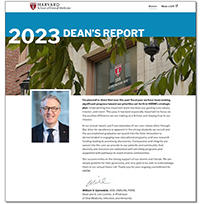
A new initiative, the Generative Artificial Intelligence (AI) Summer Research Program, brought two Harvard undergraduates to Harvard School of Dental Medicine (HSDM) this summer to study ways to promote algorithmic fairness in oral health research. The first-of-its-kind program offered by the Office of the Vice Provost for Research and Harvard College Office of Undergraduate Research and Fellowships provides Harvard undergraduate students with diverse research opportunities in generative AI in a range of research settings across the University.
Harvard College students Hewan Kidanemariam and Gabriel Maxemin chose HSDM for their interest in health equity and technology. They spent the last 10 weeks learning alongside Dr. Hawazin Elani, assistant professor in Oral Health Policy and Epidemiology, and her team whose research focuses on oral health disparities and algorithmic bias in machine learning.
“Being one of the 30 principal investigators participating in this program highlights the importance of oral health,” said Elani. “This pilot program provides an opportunity to catalyze cross-disciplinary collaboration among students at all levels— from undergraduates to postdoctoral researchers—and position HSDM as a key site for cutting-edge research to advance oral health research.”
 The HSDM project run by Elani’s team aims to address these challenges by supporting those involved in identifying and mitigating algorithmic biases in oral health research, presenting an exciting avenue for students to engage with cutting-edge technologies, gain hands-on experience in machine learning and AI, and directly address health disparities.
The HSDM project run by Elani’s team aims to address these challenges by supporting those involved in identifying and mitigating algorithmic biases in oral health research, presenting an exciting avenue for students to engage with cutting-edge technologies, gain hands-on experience in machine learning and AI, and directly address health disparities.
“Access to oral health care remains challenging for low-income populations and racial and ethnic minorities. And algorithmic bias in machine learning (ML) models poses a significant concern, potentially exacerbating these disparities among vulnerable populations,” said Elani. “As a health disparities researcher, I am naturally concerned about how ML could further widen these gaps. I was excited to have the students learn about the impact of machine learning on health care disparities and develop strategies for creating fair algorithms to reduce these inequities. Their enthusiasm and dedication to tackling such critical issues were truly inspiring.”
Kidanemariam and Maxemin were eager to tackle these real-world problems. They both brought strong experience in the sciences and information technology to the task. Kidanemariam is a rising senior at Harvard College studying computer science and statistics. Maxemin graduated in spring 2024 with joint concentrations in chemistry and physics, and earth and planetary sciences.
“Growing up in rural Ethiopia, I witnessed firsthand the devastating impact of limited access to health care technology on health outcomes,” said Kidanemariam. “This project deeply resonates with me as it offers the opportunity to support underserved and vulnerable populations who are most at risk of being harmed by algorithmic bias—by working at the intersection of technology and fairness.”
Throughout the program, the duo worked with Elani and her group to develop a customized large language model (LLM), also known as a chatbot, that incorporates knowledge about algorithmic fairness. The goal is through developing an interactive engagement engine, the model will be trained to recognize and address biases that could arise during the machine learning process. This platform will also offer real-time feedback to users, guiding them in understanding and addressing bias concerns throughout the research process.
“By customizing the LLM with these capabilities, we’ve aimed to create a versatile tool that can be applied to various domains, from health care to finance, to detect and reduce algorithmic bias,” Kidanemariam said.
Maxemin and Kidanemariam also had the opportunity to work daily with faculty experts, machine learning specialists, and HSDM students. Their research taught them how to navigate the ambiguity of fairness in machine learning.
“The topic of fairness seems to be left behind as AI technologies evolve,” said Maxemin. “We learned that in order for our chatbot to maximize its performance, it must be informed by research outside the scope of just dentistry.”
The team hopes that the platform they created will provide a space where users can inquire about algorithmic fairness and be equipped with the tools and resources needed when developing their own models.
“Our hope is that algorithms employed within dentistry in the future are fair and unbiased, ensuring health care equity,” Maxemin said.
Both Maxemin and Kidanemariam look forward to applying the skills and knowledge learned through the summer program to their future careers in science and technology.
“Being a part of the community at the Harvard School of Dental Medicine has been really exciting. I’m lucky to be able to work at the intersection of such interesting fields,” said Maxemin.


